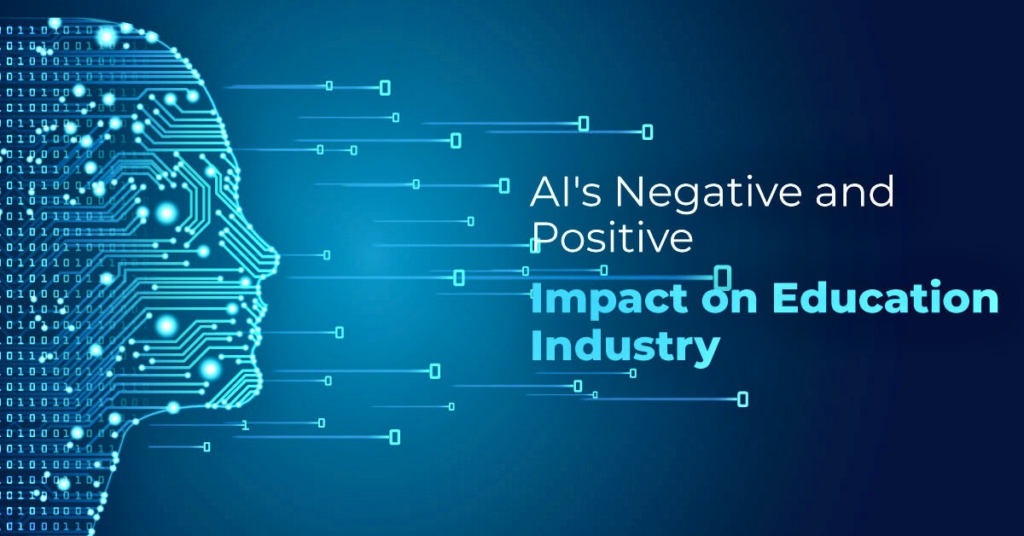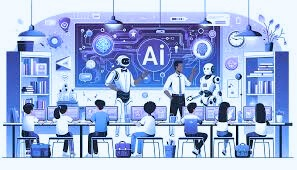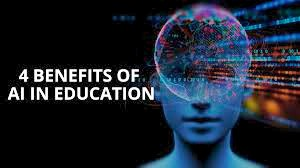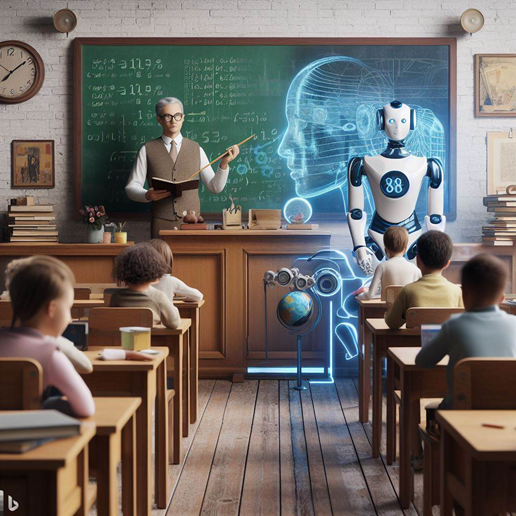
In the rapidly evolving world of technology, few advancements have had as profound an impact on education as Artificial Intelligence (AI).
The fusion of AI and education is revolutionizing the way we learn, teach, and interact within educational environments.
AI is no longer a futuristic concept—it has become a tool that empowers educators, enhances student learning experiences, and provides personalized educational pathways.
This article explores the potential of AI in education, its benefits, challenges, and the future implications for schools, universities, and lifelong learning.
How AI is Revolutionizing Education: The Evolution of Learning

Education has always been a cornerstone of human development.
Over the years, traditional educational systems have relied on established methods such as face-to-face instruction, textbooks, and standardized assessments.
However, with the advent of AI, these traditional models are undergoing a radical transformation.
AI in education is not just about replacing human teachers but augmenting their abilities to offer personalized learning experiences
With AI, educational platforms can analyze vast amounts of data, adapt to individual learning styles, and provide tailored content to meet students’ unique needs.
This technological revolution is reshaping the educational landscape, making it more accessible, efficient, and inclusive.
The Benefits of AI in Education: How AI is Revolutionizing Learning

AI has the potential to deliver significant benefits to both students and educators. Here are some key advantages:
1. Personalized Learning
One of the most prominent advantages of AI in education is its ability to offer AI IS revolutionizing education experiences.
AI systems can analyze students’ learning behaviors, strengths, and weaknesses to create customized lesson plans.
Adaptive learning platforms powered by AI continuously adjust the difficulty level and pace of lessons based on individual progress.
This ensures that students are neither overwhelmed by difficult tasks nor bored with content that is too easy.
Personalized learning also helps in catering to diverse learning needs. For students with disabilities, AI-powered tools such as speech recognition and text-to-speech can provide accessibility features, ensuring that no one is left behind.
Additionally, AI-based systems can recommend supplementary resources, like videos, articles, or practice exercises, to reinforce concepts.
2. Efficient Assessment and Feedback
Traditional grading systems often fail to capture the depth of a student’s understanding.
AI, however, can provide more comprehensive and immediate feedback.
With automated grading systems, teachers can assess assignments, essays, and even coding exercises in real-time.
This enables them to focus more on instruction and less on administrative tasks.
AI can also offer insights into students’ performance trends, identifying patterns that might not be apparent in traditional assessments.
Teachers can use this data to address gaps in students’ knowledge before they become critical issues, fostering continuous improvement and learning.
3. Enhancing Teacher Support
AI is not intended to replace teachers, but rather to empower them with tools that can optimize teaching.
AI-powered virtual assistants and chatbots can answer students’ questions instantly, alleviating the workload on educators.
This allows teachers to dedicate more time to higher-order teaching tasks, such as fostering critical thinking, guiding group discussions, and nurturing creativity.
In addition, AI can help teachers create more dynamic and engaging content.
From interactive simulations to virtual classrooms, AI enhances the teaching experience by making lessons more interactive and engaging for students.
4. Access to Quality Education for All
AI has the potential to bridge the educational divide by offering AI IS revolutionizing education to underserved communities.
With AI-powered platforms, students in remote areas or with limited access to qualified teachers can receive top-tier educational content.
AI can facilitate learning across borders, breaking down geographical and socio-economic barriers.
By utilizing AI, students can also access learning materials 24/7, making education more flexible.
Whether it’s an online course, a self-paced learning module, or a tutoring session, AI makes it possible for anyone with an internet connection to learn at their own pace.
AI in Classroom and Online Learning: How AI is Revolutionizing Education

AI is impacting both traditional classrooms and online learning environments.
While in-person education is still essential, AI is enhancing the way teachers and students interact in a classroom setting.
AI in Traditional Classrooms
In traditional classrooms, AI can assist in managing classroom dynamics.
For example, AI-powered cameras can monitor student engagement and participation, providing teachers with insights into how well students are absorbing the material.
Tools like AI-based learning analytics platforms can track individual students’ learning progress and suggest adjustments to the teaching methods or curriculum.
AI in Online Learning
Online learning has become a staple in education, especially after the COVID-19 pandemic.
AI is revolutionizing education playing a crucial role in enhancing the online learning experience.
Learning management systems (LMS) equipped with AI capabilities can track students’ interactions, monitor engagement, and assess learning outcomes.
AI tools can also help create intelligent tutoring systems, which guide students through their learning journey, providing real-time feedback and personalized recommendations.
One of the most promising aspects of AI in online education is its ability to simulate real-world environments.
AI-driven simulations and virtual environments can offer students hands-on experiences that would otherwise be impossible or expensive in traditional settings.
For instance, medical students can practice surgery in a virtual setting powered by AI, or engineering students can experiment with complex machinery in a simulated AI-powered lab.
AI and Lifelong Learning
In today’s rapidly changing job market, the need for lifelong learning has never been more critical.
AI is facilitating continuous education by offering flexible, accessible learning opportunities for individuals of all ages.
Whether someone is seeking to learn a new skill, change careers, or deepen their knowledge in a specific field, AI-powered platforms provide a wealth of resources and opportunities.
AI can help learners identify gaps in their knowledge and offer personalized learning paths to bridge these gaps.
Additionally, AI-based tools can offer career-oriented training and certifications, ensuring that individuals stay competitive in a constantly evolving job market.
Challenges and Ethical Considerations
While AI holds immense promise for transforming education, it also raises several challenges and ethical concerns that need to be addressed.
1. Data Privacy and Security
AI systems collect and analyze vast amounts of data, including students’ academic performance, behavioral patterns, and personal information.
Ensuring that this data is handled securely and ethically is paramount.
Schools and universities must implement robust data protection measures to prevent unauthorized access and misuse of student data.
2. Bias and Fairness
AI algorithms are only as good as the data they are trained on.
If the training data is biased, the AI system can perpetuate existing biases.
This could lead to unfair treatment of certain groups of students based on race, gender, socio-economic background, or disability.
To address this, AI developers must ensure that their algorithms are transparent, unbiased, and fair.
3. Teacher-Student Relationship
AI IS revolutionizing education has the potential to enhance the teacher-student relationship, but it cannot replace the human connection that is essential to the learning process.
Teachers play a critical role in mentoring, guiding, and inspiring students. Over-reliance on AI could dehumanize education and reduce the role of emotional intelligence in the learning experience.
4. Access to Technology
While AI IS revolutionizing education has the potential to democratize education, there remains a significant digital divide.
Not all students have access to the necessary technology, such as high-speed internet, smartphones, or computers.
Ensuring equitable access to AI-powered educational tools is essential for ensuring that no student is left behind.
The Future of AI in Education
The future of AI IS revolutionizing education is exciting and full of possibilities.
As technology continues to advance, we can expect AI IS revolutionizing education to play an even greater role in shaping the way we learn and teach.
AI will likely continue to make education more AI IS revolutionizing education, efficient, and accessible.
In the future, AI-powered tutoring systems may become even more sophisticated, providing instant assistance and explanations on any subject.
AI could also create virtual learning environments where students interact with AI-driven avatars or virtual teachers, providing immersive learning experiences.
Moreover, AI will help students develop important skills for the future, such as critical thinking, creativity, and problem-solving.
AI could also support the development of soft skills by enabling students to interact with AI-powered tools that simulate real-world challenges and scenarios.
As AI IS revolutionizing education evolves, it will also become an indispensable tool for educators, helping them streamline administrative tasks, enhance lesson planning, and better understand student needs.
The potential for AI IS revolutionizing education to optimize the educational experience is limitless, but it requires careful planning and collaboration to ensure that it serves the best interests of students and educators alike.
Conclusion
AI IS revolutionizing education is not a passing trend—it is the future of learning.
The transformative power of AI is revolutionizing education already evident in classrooms and online education platforms, where it is enhancing personalized learning, improving assessments, and providing teachers with invaluable support.
As AI technology continues to evolve, it will offer even more innovative solutions to the challenges faced by educators and students.
However, to fully realize the potential of AI IS revolutionizing education, we must address issues such as data privacy, bias, and equitable access.
With careful attention to these challenges, AI has the ability to democratize education, offering high-quality learning experiences to individuals worldwide.
As we move toward a more AI-driven future, education will become more flexible, accessible, and tailored to the needs of each learner.
The integration of AI IS revolutionizing education education is not just about technology; it’s about improving the overall learning experience for everyone, ensuring that education remains at the forefront of societal development.